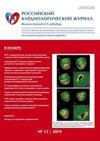Mature neutrophils as a marker of hypoechoic carotid plaques and a predictor of polyvascular disease progression
Q3 Medicine
引用次数: 0
Abstract
Aim. To evaluate the diagnostic and prognostic value of circulating mature and aging neutrophils in relation to hypoechoic carotid plaques and short-term progression of carotid and multifocal atherosclerosis.Material and methods. The study included 200 patients (89 males and 111 females), aged 40-64 years. All patients underwent duplex ultrasound of the carotid and lower extremity arteries at the first visit and at a repeat visit after 12-24 months. Ultrasound morphology of carotid plaques was assessed using greyscale median analysis. Phenotyping and differentiation of neutrophil subpopulations was carried out using flow cytometry.Results. The absolute and relative number of mature neutrophils directly correlated with ultrasound indicators of carotid atherosclerosis, while the number of aging neutrophils — with the degree of lower extremity artery stenosis. Patients with hypoechoic carotid plaques were characterized by a significantly higher absolute number of mature neutrophils (p=0,0340). An increase in the number of mature neutrophils over 3023,0 cells/μL made it possible to predict the hypoechoic carotid plaques with a sensitivity of 75,0% and a specificity of 69,5%. Patients with carotid atherosclerosis progression had a higher absolute number of mature neutrophils (p=0,0140), as did patients with progression of multifocal atherosclerosis (p=0,0162). An increase in the number of mature neutrophils more than 3223,0 cells/μL was associated with an increase in the relative risk of polyvascular disease progression by 3,09 times (95% confidence interval, 1,34-7,17; p=0,0082) after adjustment for baseline cardiovascular disease risk.Conclusion. Among patients aged 40-64 years, increased numbers of circulating mature neutrophils are associated with an increased carotid plaque burden and hypoechoic carotid plaques. An increase in the number of mature neutrophils over 3223,0 cells/μL was associated with a 3,09-fold increase in the relative risk of polyvascular disease after adjustment for baseline cardiovascular risk.成熟中性粒细胞是颈动脉低回声斑块的标记和多血管疾病进展的预测因子
目的评估循环中成熟和老化中性粒细胞与颈动脉低回声斑块以及颈动脉和多灶动脉粥样硬化短期进展的诊断和预后价值。研究包括 200 名患者(89 名男性和 111 名女性),年龄在 40-64 岁之间。所有患者在首次就诊和 12-24 个月后复诊时均接受了颈动脉和下肢动脉的双工超声检查。颈动脉斑块的超声形态采用灰度中值分析法进行评估。使用流式细胞术对中性粒细胞亚群进行表型和分化。成熟中性粒细胞的绝对数量和相对数量与颈动脉粥样硬化的超声指标直接相关,而老化中性粒细胞的数量则与下肢动脉狭窄程度相关。颈动脉低回声斑块患者的特点是成熟中性粒细胞绝对数量明显较多(P=0,0340)。成熟中性粒细胞数量超过 3023.0 cells/μL 时,就可以预测颈动脉低回声斑块,敏感性为 75.0%,特异性为 69.5%。颈动脉粥样硬化进展患者的成熟中性粒细胞绝对数量较高(p=0,0140),多灶性动脉粥样硬化进展患者的成熟中性粒细胞绝对数量也较高(p=0,0162)。在调整基线心血管疾病风险后,成熟中性粒细胞数量增加超过 3223.0 cells/μL 与多血管疾病进展相对风险增加 3.09 倍(95% 置信区间,1.34-7.17;p=0.0082)有关。在 40-64 岁的患者中,循环中的成熟中性粒细胞数量增加与颈动脉斑块负荷和颈动脉低回声斑块增加有关。在调整了基线心血管风险后,成熟中性粒细胞数量超过3223.0 cells/μL与多血管疾病相对风险增加3.09倍有关。
本文章由计算机程序翻译,如有差异,请以英文原文为准。
求助全文
约1分钟内获得全文
求助全文
来源期刊

Russian Journal of Cardiology
Medicine-Cardiology and Cardiovascular Medicine
CiteScore
2.20
自引率
0.00%
发文量
185
审稿时长
1 months
期刊介绍:
Russian Journal of Cardiology has been issued since 1996. The language of this publication is Russian, with tables of contents and abstracts of all articles presented in English as well. Editor-in-Chief: Prof. Eugene V.Shlyakhto, President of the Russian Society of Cardiology.
The aim of the journal is both scientific and practical, also with referring to organizing matters of the Society. The best of all cardiologic research in Russia is submitted to the Journal. Moreover, it contains useful tips and clinical examples for practicing cardiologists. Journal is peer-reviewed, with multi-stage editing. The editorial board is presented by the leading cardiologists from different cities of Russia.
 求助内容:
求助内容: 应助结果提醒方式:
应助结果提醒方式:


